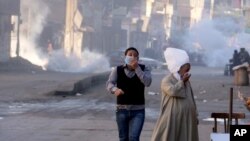WASHINGTON —
The violent aftermath of the Arab Spring is taking a toll on the mental health of people in the Middle East. And with no end in sight to turmoil, some psychiatrists warn that the numbers suffering from post-traumatic stress disorders and severe depression will climb.
In the northern Lebanese town of Tripoli, a six-year-old refugee boy from the Syrian town of Hama explains the picture he’s drawn of a house and an artillery battery. He pushes aggressively into the center of a circle of refugee children to detail the dangers he faced in Syria from exploding rockets.
Psychiatrist Mohamed Khalil says it isn’t unusual for refugee kids from the two-and-half year Syrian civil war to draw weapons and to veer from hyperactivity to withdrawal.
He says traumatized children who have witnessed brutality and violent death often regress and wet their beds, suck their thumbs and experience restless, nightmare-filled sleep.
“You get isolation or social isolation, and they don’t want to speak to people but you can also get aggression, and the main toys for children is guns," said Khalil.
Khalil says the region is engulfed in a public health crisis that is gaining little media coverage or sufficient attention from international relief agencies.
There are no reliable numbers of those struggling with mental health problems. But across the region, pyschiatrists say violence and political turmoil is causing severe depression, anxiety, and post-traumatic stress disorders.
The problems often are left untreated. In Egypt’s capital, Cairo, psychiatirst Ahmed Abdellah says a cultural stigma about mental health problems hinders the medical professionals trying to raise the alarm or to secure government help.
He says three years of revolution and counter-revolution in Egypt are exacting a heavy price in mental health terms.
“The problem is there’s a gap between what is going on in the society and between what is in clinics and in psychiatric institutes, especially the governmental institutes. Nowadays we have massive numbers of post-traumatic stress disorder cases. But you will not find maybe any of these cases in psychiatric departments," said Abdellah.
He says not only are people left to suffer when they could be helped but also that more problems are being stored up when victims of post-traumatic stress disorders are not treated.
“To leave somebody with trauma untreated, this opens him and the society to many expectations. First of all you are open for more aggression, you are open for more stress and displaced stress. We are open to more violence, actually. If you have maybe tens of thousands, maybe more of people who are suffering, you could not expect them to work, to share, to intervene, to interact," he said.
Young people are especially suffering. There are as many as 50,000 displaced Syrian children under the age of 16 in Lebanon.
Based on his previous work with trauma sufferers elsewhere in conflict zones, Khalil estimates that at least one-third are at risk of developing severe PTSD, and as a result develop into adults who struggle to cope with daily life.
In the northern Lebanese town of Tripoli, a six-year-old refugee boy from the Syrian town of Hama explains the picture he’s drawn of a house and an artillery battery. He pushes aggressively into the center of a circle of refugee children to detail the dangers he faced in Syria from exploding rockets.
Psychiatrist Mohamed Khalil says it isn’t unusual for refugee kids from the two-and-half year Syrian civil war to draw weapons and to veer from hyperactivity to withdrawal.
He says traumatized children who have witnessed brutality and violent death often regress and wet their beds, suck their thumbs and experience restless, nightmare-filled sleep.
“You get isolation or social isolation, and they don’t want to speak to people but you can also get aggression, and the main toys for children is guns," said Khalil.
Khalil says the region is engulfed in a public health crisis that is gaining little media coverage or sufficient attention from international relief agencies.
There are no reliable numbers of those struggling with mental health problems. But across the region, pyschiatrists say violence and political turmoil is causing severe depression, anxiety, and post-traumatic stress disorders.
The problems often are left untreated. In Egypt’s capital, Cairo, psychiatirst Ahmed Abdellah says a cultural stigma about mental health problems hinders the medical professionals trying to raise the alarm or to secure government help.
He says three years of revolution and counter-revolution in Egypt are exacting a heavy price in mental health terms.
“The problem is there’s a gap between what is going on in the society and between what is in clinics and in psychiatric institutes, especially the governmental institutes. Nowadays we have massive numbers of post-traumatic stress disorder cases. But you will not find maybe any of these cases in psychiatric departments," said Abdellah.
He says not only are people left to suffer when they could be helped but also that more problems are being stored up when victims of post-traumatic stress disorders are not treated.
“To leave somebody with trauma untreated, this opens him and the society to many expectations. First of all you are open for more aggression, you are open for more stress and displaced stress. We are open to more violence, actually. If you have maybe tens of thousands, maybe more of people who are suffering, you could not expect them to work, to share, to intervene, to interact," he said.
Young people are especially suffering. There are as many as 50,000 displaced Syrian children under the age of 16 in Lebanon.
Based on his previous work with trauma sufferers elsewhere in conflict zones, Khalil estimates that at least one-third are at risk of developing severe PTSD, and as a result develop into adults who struggle to cope with daily life.




